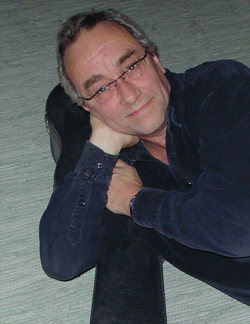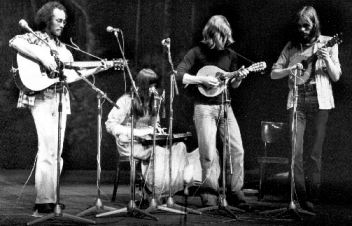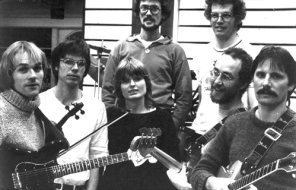 FolkWorld
article by Eelco Schilder :
FolkWorld
article by Eelco Schilder :
Traditional music from the Netherlands Part V:
ROB SMALING
For this edition of traditional music in the Netherlands I talked
to Rob Smaling. He came to my attention when I found out that he was part of
the Dutch folkscene, not only during the revival in the seventies, but also
before this period. Besides that he was a member of one of the first bands who
recorded traditional Dutch material called; Wargaren. For a whole afternoon
we sat down and he told me his story, showed me old pictures and we listened
to some unique recordings. This article is just a small reflection of an intriguing
afternoon of Dutch folkrevival history.
Why folk?
Already in the sixties Rob showed an interest in folkmusic.
First by listening to the heroes of that period, later as a musician himself.
Rob: 'I got interested in folk music by listening to artists such as Dylan and
Baez. Reading about Dylan led me to Woody Guthrie and other aspects of traditional
American folkmusic. It was an early lp by Alex Campbell called Way out West,
with American folksongs that got my attention and I found out he had recorded
English songs as well. It was the way he arranged old songs; with respect but
also in his own natural way. It's hard to explain why this was the music that
I liked, it must have something to do with emotion. I mean, you like a certain
style or you don't like it. I might as well have liked classical music. When
I got interested in folkmusic the researcher in me came to life. I kept on searching
for backgrounds and connections and slowly but surely I discovered the richness
of folkmusic. For instance finding out that many American songs could be traced
back to the British Isles made me become aware of all these wonderful mechanisms
in traditional culture.
 It
was also Dylan who made me decide to be a musician myself I started of with
the blues, mainly bottleneck style. The inspiration came from a American Folkblues
Festival concert, I attended one day in Amsterdam in 1967. It featured heroes
like Bukka White, Skip James and most of all Son House. A short time after ,
that same year, there was a folk-talenthunt in Utrecht, my hometown, and I took
my chance. I started off with a blues. There was a lot of mumbling in the audience
and among jury members after this first song and I thought they didn't like
it at all. So I decided to do an Alex Campbell song instead of a second blues.
Afterwards I found out I didn't win the contest because of that second choice.
The mumbling jury appeared to have been very impressed by the blues performance.
It
was also Dylan who made me decide to be a musician myself I started of with
the blues, mainly bottleneck style. The inspiration came from a American Folkblues
Festival concert, I attended one day in Amsterdam in 1967. It featured heroes
like Bukka White, Skip James and most of all Son House. A short time after ,
that same year, there was a folk-talenthunt in Utrecht, my hometown, and I took
my chance. I started off with a blues. There was a lot of mumbling in the audience
and among jury members after this first song and I thought they didn't like
it at all. So I decided to do an Alex Campbell song instead of a second blues.
Afterwards I found out I didn't win the contest because of that second choice.
The mumbling jury appeared to have been very impressed by the blues performance.
This folk-talenthunt had produced a lot of new unknown musicians and some people
took the initiative to start a club where they could perform about once each
two weeks. This must have been about 1966, Folk Centre Utrecht (FCU) was born.
In the beginning I took part as musician, later on I started to do some soundengineering.
At the end of the sixties we even released an lp with all musicians who regularly
played at the club. The lp was recorded in a small office, cables under the
door and the musicians in another room, almost like the old field-recordings.
Gradually I started participating in the organisation of the club. In the years
that followed we started setting up festivals, this happened in 1970, 74 and
76. One of those festivals had Scottish music (amongst others with the McCalmans
and researcher Hamish Henderson) as central theme. I already had an interest
in Dutch traditional music. So when at one of these festivals musicians asked
us if we didn't have Dutch material because we always copied English songs,
for me that was the final push to dig deeper into our own traditional music
culture.'
Wargaren
Already on the FCU lp Rob plays with his group Pitchwheel English songs. This
group would later turn into Wargaren and record one of the first and one of
the best, Dutch acoustic folk records.
 Rob: ' Pitchwheel was the first attempt to start a folkgroup although at that
time we concentrated on non-Dutch material. I started this with Gert-Jan Smidt
and we used to play at my small room in the attic. One day we heard Rina de
Heus, who sang songs of Odetta with a unique voice, at a club and although we
were a bit shy we dared to ask her if she wanted to sing with us and she said
yes, although she was as shy about the offer as we where at the time. Shortly
after Kees van der Poel and fiddler Jurek Willig joined the group while Gert-Jan
left. One way or another all of us had an interest in Dutch traditional music
and we decided to change the name from Pitchwheel into Wargaren and concentrate
on Dutch music. This formation didn't last very long. By the time the lp Met
stille trom (With Silent Drum) was recorded in 1976, the group really didn't
exist anymore. We were a group of people with very strong personalities and
Kees went to join Wolverlei, I think that are the two main reasons we quit.
At that time I was working for several organisations that had something to do
with Dutch Traditional Culture and I also started to work for Folk live, the
only radio program on folkmusic in the Netherlands at that time. My next project
as a musician came in the early eighties. This time once more with Gert-Jan.
The project was called Deining (meaning Backwash but also Stirr). We searched
for good musicians and singers, their background was not important. We wanted
to make electric folk, but take it a bit further than Steeley and Fairport,
more into the eighties. More extreme using amplified instruments to underline
the emotional content of the material, not just to lay down a rhythm. For some
months we improvised and experimented with the traditional material. To show
the sources and the results we included a compilation of the original fieldrecordings
on the LP.
Rob: ' Pitchwheel was the first attempt to start a folkgroup although at that
time we concentrated on non-Dutch material. I started this with Gert-Jan Smidt
and we used to play at my small room in the attic. One day we heard Rina de
Heus, who sang songs of Odetta with a unique voice, at a club and although we
were a bit shy we dared to ask her if she wanted to sing with us and she said
yes, although she was as shy about the offer as we where at the time. Shortly
after Kees van der Poel and fiddler Jurek Willig joined the group while Gert-Jan
left. One way or another all of us had an interest in Dutch traditional music
and we decided to change the name from Pitchwheel into Wargaren and concentrate
on Dutch music. This formation didn't last very long. By the time the lp Met
stille trom (With Silent Drum) was recorded in 1976, the group really didn't
exist anymore. We were a group of people with very strong personalities and
Kees went to join Wolverlei, I think that are the two main reasons we quit.
At that time I was working for several organisations that had something to do
with Dutch Traditional Culture and I also started to work for Folk live, the
only radio program on folkmusic in the Netherlands at that time. My next project
as a musician came in the early eighties. This time once more with Gert-Jan.
The project was called Deining (meaning Backwash but also Stirr). We searched
for good musicians and singers, their background was not important. We wanted
to make electric folk, but take it a bit further than Steeley and Fairport,
more into the eighties. More extreme using amplified instruments to underline
the emotional content of the material, not just to lay down a rhythm. For some
months we improvised and experimented with the traditional material. To show
the sources and the results we included a compilation of the original fieldrecordings
on the LP. 
I'm still proud of the result, although our own demo's had more edge to it.
But that's what happens if you get the opportunity to work for a year in spare
time of a professional studio with ditto soundengineer and studio musicians
participating! After Deining I did one more project for a EBU radiofestival
in Hamburg with a group of traditional musicians of my choice. When I returned
from the trip to Germany, I put my guitar in its case, hardly ever touching
it again. For some years I lost my interest in folkmusic and it's only since
a while that I'm taking time to rediscover today's folkscene. In particular
I like the experimental, creative approach of groups like Hedningarna from Sweden
and the North African/European mix of Orchestre National de Barbes from France.
It seems to me there's sort of a second folkrevival emerging, with a whole new
generation appreciating this kind of music.
One of these days I'll probably write an article about the early days of "the
first" folkrevival in the Netherlands.
Especially the Folk Centre Utrecht period is not very well documented, but very
interesting. That first movement was a very broad one, consisting of working
people as well as students. I collected a lot of newspaper clippings and pictures
at that time. Would be nice to share this part of history with the folkcommunity
of today.'
Recommended recordings by Rob Smaling
Rob Smaling also choose some Dutch/Belgian records that in his opinion were
highlights in the Dutch folk scene.
- Wolverlei "Wind tegen"(Universe DLS 50) with the most beautiful interpretation
ever of a Dutch fieldrecording "Er reed laatst een ruiter door de straat"
(A horseman road down the street)
- Deining (Crossroad CR28133) most creative approach to Dutch traditional
music so far.

- Cees Eekels and friends (Munich/Stoof MU7440) : "Het geheim van de smid"
("The secret of the blacksmith") original squeezebox extravaganza from the
south of the Netherlands. Recorded in 1979, but a exact reproduction of how
that music sounded in the period 1920-1940.
- Rum (Philips 6320011), this album was very influential with respect to the
change many Dutch groups made from Anglo/American to Dutch Traditional repertoire.
Medieval ballads brought back to life.
Informations to the photos:
(1) Resting his case: Rob Smaling Today, a selfportrait.
(2) 1967 talentcontest picture: Rob in his Robert Johnson look trying to win
the Talenthunt.
(3) Rob Smaling in wargaren.
(4) Rob Samling solo in the seventies.
(5) Rob smaling in Deining
DISCOGRAPHY:
- Various artists: FCU (private record late sixties. with recordings of Rob's
group Pitchwheel.)
- Wargaren: Met stille trom (Universe hot103 from 1976)
- Deining: Same (crossroad 28133 from 1983)
The series "Traditional Music in The Netherlands" tries to provide
an overview of Dutch traditional music from both the past and the present, presenting
musicians or groups who represent some of the most important trends or movements
in Dutch folk music. The first four parts of the series were:
Do you have any questions about the article? Do you want more information? Are
you interested in one of the albums mentioned above? Feel free to contact me
any time; also with suggestions for future articles etc or comments on this
article. Eelco Schilder
Back to the content of FolkWorld Features
To the content of FolkWorld No. 27
© The Mollis - Editors
of FolkWorld; Published 02/2004
All material published in FolkWorld is © The
Author via FolkWorld. Storage for private use is allowed and welcome. Reviews
and extracts of up to 200 words may be freely quoted and reproduced, if source
and author are acknowledged. For any other reproduction please ask the Editors
for permission. Although any external links from FolkWorld are chosen with greatest
care, FolkWorld and its editors do not take any responsibility for the content
of the linked external websites.
FolkWorld - Home of European Music

Layout & Idea of FolkWorld © The
Mollis - Editors of FolkWorld
 It
was also Dylan who made me decide to be a musician myself I started of with
the blues, mainly bottleneck style. The inspiration came from a American Folkblues
Festival concert, I attended one day in Amsterdam in 1967. It featured heroes
like Bukka White, Skip James and most of all Son House. A short time after ,
that same year, there was a folk-talenthunt in Utrecht, my hometown, and I took
my chance. I started off with a blues. There was a lot of mumbling in the audience
and among jury members after this first song and I thought they didn't like
it at all. So I decided to do an Alex Campbell song instead of a second blues.
Afterwards I found out I didn't win the contest because of that second choice.
The mumbling jury appeared to have been very impressed by the blues performance.
It
was also Dylan who made me decide to be a musician myself I started of with
the blues, mainly bottleneck style. The inspiration came from a American Folkblues
Festival concert, I attended one day in Amsterdam in 1967. It featured heroes
like Bukka White, Skip James and most of all Son House. A short time after ,
that same year, there was a folk-talenthunt in Utrecht, my hometown, and I took
my chance. I started off with a blues. There was a lot of mumbling in the audience
and among jury members after this first song and I thought they didn't like
it at all. So I decided to do an Alex Campbell song instead of a second blues.
Afterwards I found out I didn't win the contest because of that second choice.
The mumbling jury appeared to have been very impressed by the blues performance.
 FolkWorld
article by Eelco Schilder :
FolkWorld
article by Eelco Schilder :


